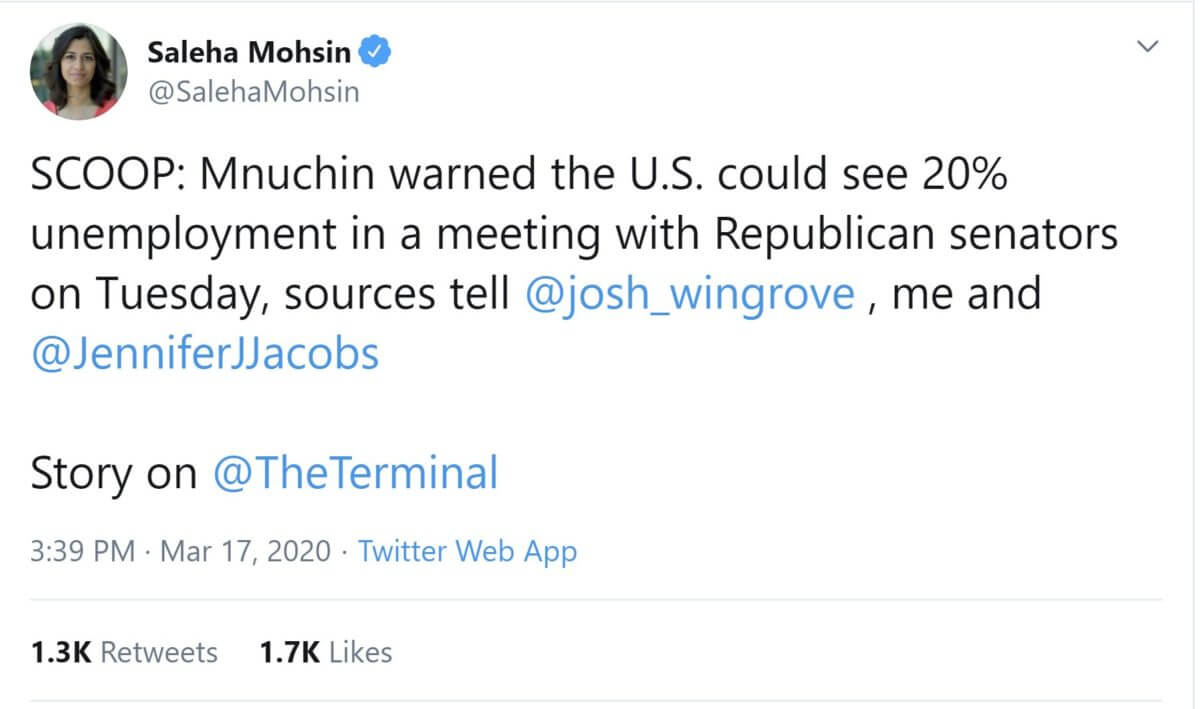Dow Futures Dive as Bloomberg Leaks Mnuchin’s 20% Unemployment Fear

Treasury Secretary Steve Mnuchin may have told Republican senators to prepare for 20% unemployment if they don’t pass President Trump’s fiscal stimulus bill. | Image: AP Photo/Patrick Semansky
- Dow futures dropped 600 points overnight after the index up more than 1,000 points Tuesday.
- Dow bears sold off as Bloomberg broke a report claiming Treasury Secretary Stephen Mnuchin believes U.S. unemployment could reach as high as 20%.
- Charles Schwab believes that institutional money will be reluctant to sell and could slow the stock market crash.
After a strong rally for the Dow Jones on Tuesday, confidence faded as futures dropped more than 2.8%, erasing a good portion of those gains.
As risk appetite darkened overnight, Bloomberg reported that Treasury Secretary Stephen Mnuchin told Republican senators unemployment could rise above 20% if they didn’t pass Trump’s extensive fiscal package.
Dow Futures Drop As Risk Appetite Darkens
Weakness was seen across the board in all of the major U.S. stock market indices , as the S&P 500, Nasdaq and Dow Jones all fell around 3%.

In the commodity sector, things were calmer, as crude oil bounced 0.5%. The black commodity is still wallowing around $27 bbl amid the Saudi-Russia price war.
A weaker dollar and some alarmingly high fiscal deficit numbers helped the price of gold continue its rally. Bullion rallied 0.7%, dragging silver along for a 2% gain. Digital asset bitcoin is sitting around $5,300 after a better day of trading.
Stocks Wobble After Bloomberg Leaks Secret Mnuchin Conversation
As the economic impact of the coronavirus looks more and more dangerous, governments around the world are doing their best to come up with some “shock and awe” fiscal packages to support businesses.
The United States is no exception as the Trump administration is considering some extremely expensive options that threaten to exacerbate an already massive debt.
Proposed measures like gifting many U.S. residents a $1,000 hand-out supported the Dow, but like t he Federal Reserve’s easy monetary policy , the new new fiscal measures could have the inverse effect if policymakers show panick.

Dow futures bore the brunt of how concerned the White House is, as Bloomberg leaked the following information from a suspicious closed-door meeting between Steve Mnuchin and a group of Republican senators:
He told the senators that he believes the economic fallout from the coronavirus is potentially worse than the 2008 financial crisis. Extraordinarily high unemployment, he said, is a possibility if lawmakers don’t swiftly provide financial assistance to wage workers and small- and medium-sized businesses.
Throwing around an unemployment number of 20% is undoubtedly alarming for an economy that has seen stats below 4% for some time.
Mnuchin is evidently trying to strong-arm senators into supporting his bill at a time when conservative lawmakers are hesitant about exacerbating the debt.
The Treasury Secretary’s theoretical statistics are entirely credible.
Unemployment stats in the U.S. are padded with high quantities of low paying, part-time service jobs . These are precisely the jobs that are most threatened by the nationwide coronavirus shutdown. Mnuchin isn’t the only one with an extremely nervous eye on the upcoming jobs report .
Charles Schwab: Dow Is Plummeting But Institutions Still Aren’t Selling
Focusing on the outlook for the stock market, it’s clear that the bears are in control. Interestingly, a report from Charles Schwab VP Jeffrey Kleintop noted that the weakness in U.S. stocks is still being driven by short term traders and not big, slow institutional money:
The fastest bear market ever seems to have been driven by short-term traders, rather than long-term individual investors. Are individual investors just slower to react and will now begin to sell and send the stock market down further? Recent history suggests this may not be the case. The rapid rebound after 2018’s fourth-quarter drop of almost 15% (as well as other similar sharp declines) have shown investors have been rewarded for sticking to their long-term plans. Individual investors, and their advisors, seem more resilient than in the past.
While a completely valid viewpoint, glass-half-empty investors will see the flip-side to this reasoning. We have seen the fastest-bear market in history despite the fact massive money still isn’t selling.
The outcome could be dictated by how badly the coronavirus spreads , and how protracted the shutdown will be.
Slow money’s pain threshold is going to face an enormous test. Credit downgrades and potential buyback cancellations in Dow companies like Apple (NASDAQ:AAPL) will be must-watch viewing for bulls and bears alike.